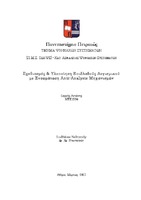Σχεδιασμός & υλοποίηση επιβλαβούς λογισμικού με ενσωμάτωση anti-analysis μηχανισμών

Προβολή/
Λέξεις κλειδιά
Επιβλαβές λογισμικό ; Μηχανισμοί προστασίας ανάλυσης ; Αντιικά ; Ασφάλεια ηλεκτρονικών υπολογιστών ; Computer security ; Malware ; Anti-Analysis ; Antivirus ; PackingΠερίληψη
Η παρούσα εργασία παρουσιάζει την ανάπτυξη ενός επιβλαβούς λογισμικού σε περιβάλλον του Λειτουργικού Συστήματος των Windows, με ενσωμάτωση anti-Analysis Μηχανισμών. Συγκεκριμένα, σχεδιάστηκε και υλοποιήθηκε ένα επιβλαβές λογισμικό τύπου Ransomware, το οποίο μετά την επιτυχή εκτέλεσή του κρυπτογραφεί τα αρχεία του χρήστη που βρίσκονται στον φάκελο-στόχο, με τον Αλγόριθμό κρυπτογράφησης AES (Advanced Encryption Standard) συμμετρικού κλειδιού και την αποστολή του κλειδιού σε έναν απομακρυσμένο εξυπηρετητή. Στην συνέχεια ερευνήθηκαν διάφοροι anti-Analysis μηχανισμοί, όπως η προστασία από Debuggers και Disassemblers, αποφυγή Virtual Machines, Sandboxes & μηχανές AVs. Επίσης, αναπτύχθηκαν διάφοροι επιπρόσθετοι μηχανισμοί προστασίας σε όλο το εύρος του anti-Analysis. Οι παραπάνω μηχανισμοί ενσωματώθηκαν στο επιβλαβές λογισμικό καθιστώντας το ανθεκτικότερο σε παρόμοιους ελέγχους. Με τον τρόπο αυτό, το επιβλαβές λογισμικό αποκτά μια ασπίδα προστασίας, τόσο σε ενδεχόμενη στατική όσο σε και δυναμική ανάλυση. Η διενέργεια μιας σειράς δοκιμών / πειραμάτων -στο πλαίσιο της ανάλυσης επιβλαβούς λογισμικού- επικυρώνουν την αποτελεσματικότητα της τελικής υλοποίησης.


